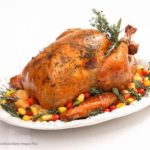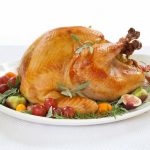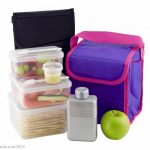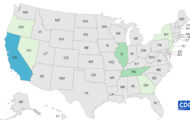Get Thanksgiving turkey safety tips from the USDA, including how to thaw and cook the bird, for a safe holiday. The biggest meal of the year comes with special food safety issues, especially regarding the turkey. The first step is thawing the turkey, if you purchased a frozen bird. Never ever thaw turkey or any meats at room temperature. Turkey can be thawed in the fridge; allow 24 hours for every four pounds of turkey. That means if you bought a 16 pound turkey, you need to allow four full days for thawing. After the turkey is thawed using this method, it can be kept, uncooked, in the fridge for two days. You can also thaw the turkey in cold water. Allow 30 minutes of thawing per pound, and submerge the turkey in its original wrapping. Change the water eery 30 minutes until the … [Read more...]
Memorial Day Food Safety Tips From USDA to Stay Safe
These Memorial Day food safety tips from the USDA will help you and your family stay safe this summer. Summer cooking and parties are prime time for possible food poisoning cases for several reasons. Warmer temperatures and outdoor picnics, parties, and grilling pose special challenges. Under Secretary for Food Safety Dr. Emilio Esteban said in a statement, "The bacteria that cause foodborne illness love the summertime as much as we do because they thrive and multiply quickly in warmer temperatures. This causes illnesses to spike during the summer. As we all spend more time outside, it is important to remember these food safety steps to keep your friends and family safe." First, always wash your hands thoroughly with soap and water before you start cooking and eating. If safe … [Read more...]
Salmonella in Raw Breaded Stuffed Chicken Is an Adulterant
Salmonella in raw breaded stuffed chicken products is an adulterant, according to a policy finalized today by the USDA. These items have been linked to many outbreaks in the United States over the last few years. The proposal was released in April 2023. These items are declared adulterated when they exceed a specific threshold (1 colony forming unit per gram or higher) for Salmonella. This is part of a broader USDA effort to reduce Salmonella illnesses associated with the raw poultry supply. Contamination in other raw poultry products will be addressed later this year. Agriculture Secretary Tom Vilsack said in a statement, "Under President Biden’s leadership, USDA is taking significant steps toward keeping American consumers safe from foodborne illness. This final determination … [Read more...]
Public Health Alert For Catfish Imported From China Issued
A public health alert for catfish imported from China has been issued by the USDA. These fish were illegally imported from the People's Republic of China and are not eligible for import into the United States. No confirmed reports of adverse reactions have been received to date in connection with the consumption of this fish. The frozen Siluriformes products were not certified for export to the U.S. by the government of China as being produced under equivalent inspection, they do not identify a certified establishment number, and they were not presented for import reinspection. These factors make the fish unfit for human consumption. The product is 12 ounce (340 gram) plastic packages containing "FROZEN STRIPED PANGASIUS MAWS." The fish package does not have any establishment … [Read more...]
Alternate Turkey Preparation Methods From the USDA
The USDA is offering tips on alternate turkey preparation methods for the Thanksgiving holiday. If you choose to prepare turkey other than roasting it in the oven, read carefully to avoid food poisoning or injuries. Whatever method you use, make sure that the turkey reaches 165°F, a temperature that must be read with a reliable and accurate thermometer. First, do not cook the turkey in brown paper bags from the grocery store. That product can emit toxic fumes and may cause a fire. The ink, glue and recycled materials in brown paper bags are especially toxic. Electric Roaster Oven If you choose to use an electric roaster oven, the cooking times and temperatures should be the same as in a conventional oven. But always read the user manual for the manufacturer's instructions. The … [Read more...]
USDA Study on Consumer Food Preparation Behavior Highlights Risks
A USDA study on consumer food preparation behavior highlights the risks of not following food safety rules. The five year study looked at how consumers prepare meals in light of the risks of food poisoning. The study was produced by the USDA's Food Safety and Inspection Service (FSIS) as part of their efforts to educate the public about safe food handling practices. USDA Under Secretary for Food Safety Dr. Emilio Esteban said in a statement, "These studies are important for USDA to understand consumer behaviors in the kitchen and it is timely to be releasing the latest findings during Food Safety Education Month. The results allow us to shape food safety communications and help consumers safely prepare food." The three areas the study concentrated on were handwashing, thermometer … [Read more...]
Labor Day Weekend Food Safety Travel Tips From the USDA
Labor Day weekend food safety travel tips come from Jesus Garcia, Public Affairs Specialist with the Food Safety Education Staff with the USDA. While many people stay at home during this long holiday weekend, others travel, especially to campsites and to go on picnics. And food safety is even more critical when you are away from home. First pack perishable foods into your cooler directly from the fridge or freezer. You can pack meat and poultry products while they are still frozen. Put an appliance thermometer in your cooler to make sure that the food stays safe and cold at 40°F or below. The danger zone, when bacteria counts can double in food every 20 minutes, is from 40°F to 140°F. Keep raw meat and poultry away from cooked foods and produce that is eaten raw, in the cooler … [Read more...]
USDA Offers Guide to Food Safety For School Lunches
Yes it's that time of the year. The USDA is offering parents a guide to food safety for school lunches. There is an inherent risk in packing perishable foods for your child to take to school every day, but with these rules you need to follow you can make sure the food stays safe to eat. USDA Under Secretary for Food Safety Dr. Emilio Esteban said in a statement, "While there have been huge strides in food safety, at least 48 million people in the U.S. are still affected by foodborne illness every year. Our children’s health and safety depend on the safe food handling practices we teach and practice at home." Food safety for school lunches starts in your kitchen. When you prepare food for your child's lunch, and your own too, follow the steps of clean, separate, cook, and chill. … [Read more...]
Celebrate the Fourth of July Without Foodborne Illness
Celebrate the Fourth of July this year without foodborne illness, with tips from the USDA about safe grilling. There are inherent risks that come with cooking in hot weather too. First, always wash your hands before cooking and handling and serving food. Handle raw meat with care, since it can be contaminated with pathogen bacteria such as E. coli, Salmonella, Listeria monocytogenes, and Campylobacter. Keep raw meats away from foods that are eaten uncooked such as raw fruits and vegetables. When you form hamburgers or season steaks, using a separate cutting board and plate. And wash your hands thoroughly with soap and water after touching uncooked meat and poultry. If you marinate the meat or poultry, keep the used marinade away from other foods, and discard it when you put the … [Read more...]
Salmonella Grand Challenge Issued on World Food Safety Day
The USDA is issuing a Salmonella Grand Challenge on World Food Safety Day 2023. This challenge brings together scientists from different specialties to fight this pathogen, which causes more than 1,000,000 foodborne illnesses in American every year. The challenge tries to develop a more effective strategy to reduce human Salmonella illnesses linked to poultry. The USDA's Agricultural Research Service (ARS) is launching this new initiative to learn more about how and where Salmonella causes the highest risk of contamination in meat and poultry products. This will help researchers develop better monitoring tools to producers can detect Salmonella contamination. This pathogen is found everywhere, on animals, in food, water, soil, and even the air. ARS is going to integrate its … [Read more...]














